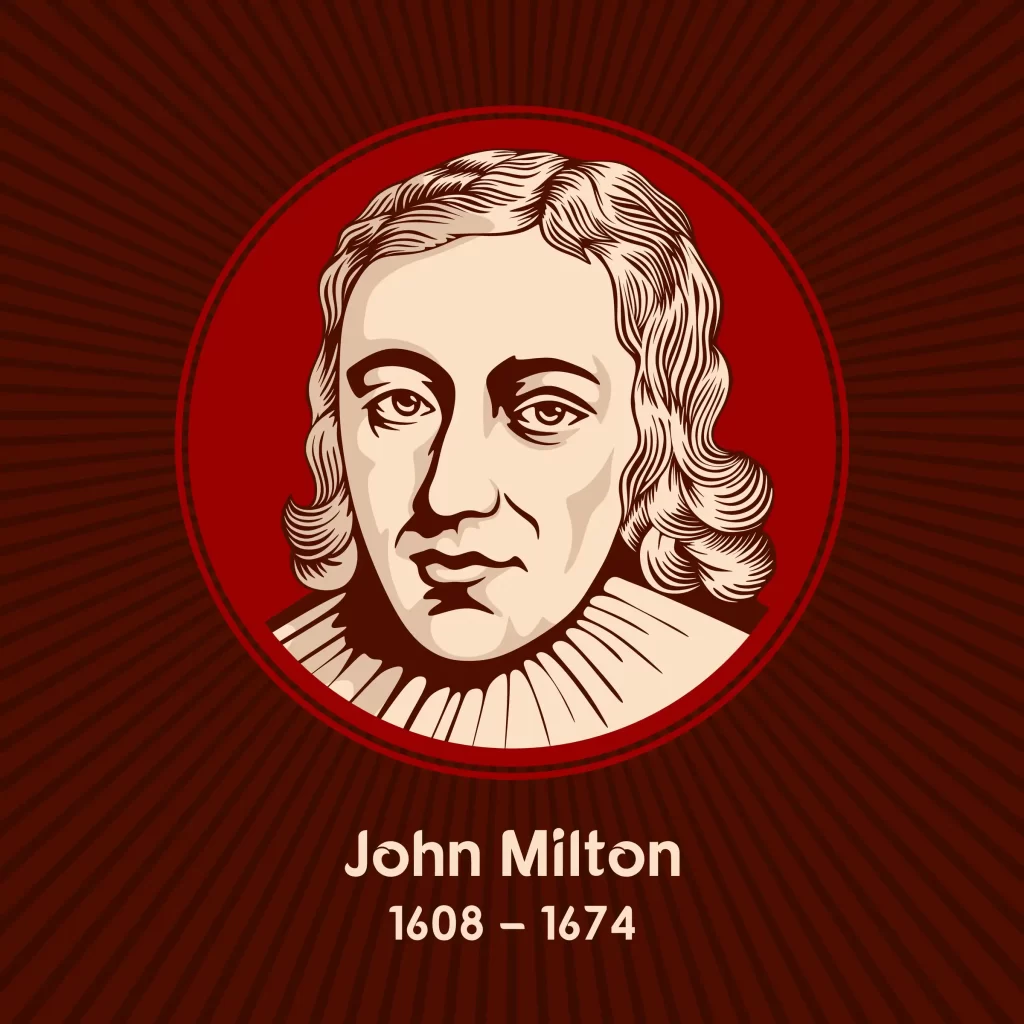Introduction
John Milton, journalist, historian, and poet of the 17th century, was born on December 9, 1608, in London, England. Paradise Lost was the book for which he is most remembered. Milton’s first career goal was becoming a priest. Attending Cambridge University only solidified his resolve to devote the rest of his life to writing and poetry. More people would read his work if they knew about his talent and potential as a poet. Awed by their praise, Milton vowed to establish himself as one of England’s top poets.

John Milton
Life
John Milton (1608-74) is widely recognised as one of the most influential poets of the seventeenth century and one of the most important writers in the history of the English language. The English poet John Milton defended individual liberty. He held that every person ought to read and comprehend the Bible since he was a Protestant. Famous for his advocacy of unrestricted publishing and his poetic masterwork Paradise Lost.
As a result of his deep engagement in politics, Milton regularly interspersed political pamphlets with his other works.
Being a protestant who valued religious liberty, Milton often found himself at odds with the Roman Catholic Church, which vigorously defended the rights of Protestants.
John Milton joined Oliver Cromwell’s government when the monarchy was toppled.
In 1643, Milton tied the knot with Mary Powell, but their relationship was doomed to failure.
In his writings around this time, Milton first began to discuss the positive aspects of divorce.
His marriage was a source of great stress, and the works were ultimately banned in Parliament. In 1652, while giving birth to the fourth of their children, his wife died. A year after losing his only son, he also lost his eyesight.
Milton maintained his writing output throughout this time.
Instead of writing his own work, he had a coworker jot it down when he dictated it to them. At some point, Milton would tie the knot twice more.
Milton, when his vision began to fail, had to face his own battle with nightfall.
So that he could keep writing, he had assistants hired. One of his best-known helpers is fellow writer Andrew Marvell. At the Restoration of the Monarchy in 1660, Milton was freed from jail. Throughout the rest of his life, he continued to write.
He died in London, England on November 8th, 1674. He was buried close to his father at Cripplegate. By 1700, Paradise Lost had already been recognised as one of the finest works ever written in the English language.
Major Poems
English poet John Milton lived in the seventeenth century, and his writings have had a significant impact on literature. Between 1632 to 1674, Milton produced both poetry and prose, while his epic poetry is his most well-known work.
Milton’s major works are all available at Special Collections and Archives, including Paradise Regained, L’Allegro, Paradise Lost and Il Penseroso.
One of the most well-known pieces of English literature is Paradise Lost. Ten books made up the initial edition, which was released in 1667.Twelve booklets made up a later edition that was released in 1674. There are more than 10,000 verse lines in Paradise Lost. In it, Adam and Eve’s creation, failure to withstand Satan’s temptations, and eventual fall from grace are all described, along with their creation.
Milton’s Paradise Regained, which was initially published in 1671, is another well-known piece. In Milton’s Paradise Regained, Satan and the Son of God engage in a philosophical discussion. The Son of God aspires to noble consciousness, an attribute. Satan, on the other hand, thinks it’s okay to go after material things like fame, fortune, and power.
Another significant Milton work housed in Special Collections and Archives is Il Penseroso and L’Allegro. David Bogue released this edition in 1855 in London. This early effort greatly influenced his later compositions as he developed. His poetry evolved as he aged, becoming more sophisticated and perceptive.
He used what he dubbed “divinest Melancholy” to create his most potent masterpieces despite the fact that he had lost his sight.
Conclusion
Themes from politics, religion, and the individual are prevalent in Milton’s works. For instance, some works contain imagery of good and evil as well as light and darkness. His great intellectual, spiritual, and moral qualities were generally lauded by eighteenth-century poets.
Frequently Asked Questions
1. What topic dominates John Milton’s poetry?
Ans. His prose writings were referred to as the left hand’s accomplishments. Milton used his poetry to confront political and religious issues, the main themes of his writing as well, much like the renowned literary predecessors with whom he invites comparison.
2. What function does poetry serve for Milton?
Ans. Milton developed a thorough understanding of what poetry meant, despite the fact that morally instructive poetry was a Renaissance cliché. Poetry, according to him, has the ability to seeds of integrity and social decorum were bred into the great people, to alleviate the disturbance of thought, and set the affections in proper tune.
3. What are the key topics of Paradise Lost by John Milton?
Ans. The three sections that make up Paradise Lost’s religious theme are as follows: Disobedience, eternal providence, and God’s justification of mankind are the first two. Conversations about Paradise Lost Frequently focus on the third and final of these three, leaving out the previous two.
 Mission Statement
Mission Statement
“Empower every student to achieve full potential”
88Guru has been established with the social objective of making quality video-based learning material available to all Indian students. Technology, Connectivity and Social Media are rapidly changing the world of Education and we wish to lead the transformation of the tuition industry in India.
88Guru is the perfect complement to the current tuition model. 88Guru creates a wonderful opportunity for children and parents to bond while engaging in a valuable learning activity. It also provides the complete curriculum at your fingertips for those moments when you need some help at short notice. We believe that this mode of tuition could be transformational, adding hours to a child's day while providing complete control over the learning process.
Every course is taught by the best teachers from India's top schools and conducted in an engaging manner to keep students involved. The e-learning process consists of video-based instructions, computer-graded assignments, and a dashboard which allows the student and parent to track progress.


